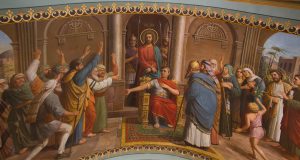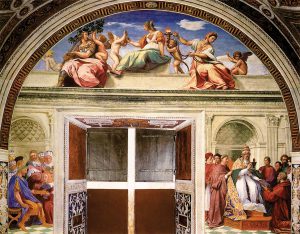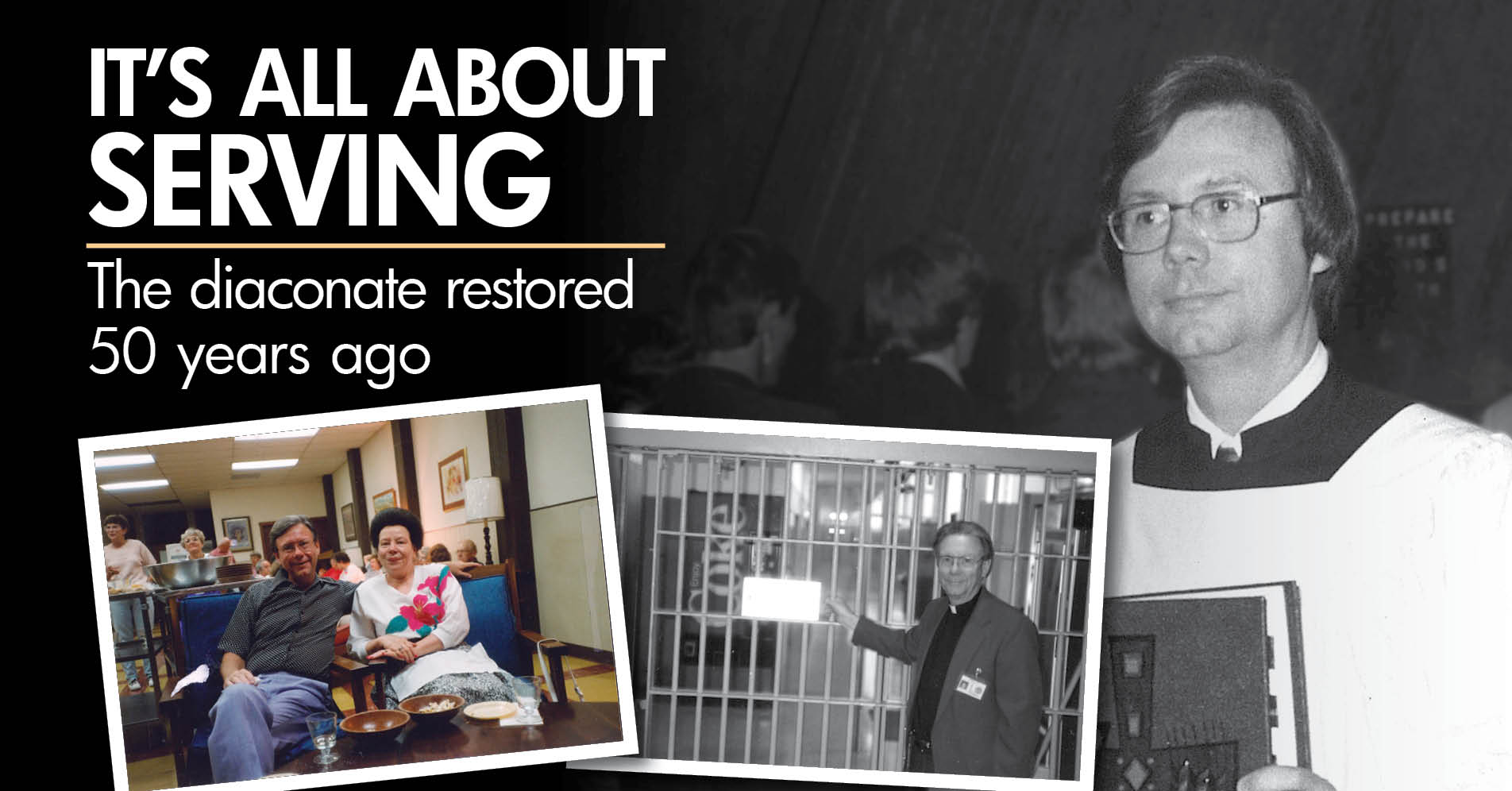
Jim Walden made a Cursillo retreat and became excited about the idea of serving the Lord in some way. His sister, a nun, mentioned the idea of becoming a deacon.
At that time, in the mid-1970s, there were no deacons in the Diocese of Sioux Falls. But through Msgr. John McEneaney, Walden approached Bishop Lambert Hoch and began a formation process that led to his ordination in July of 1977 as the first deacon in this diocese.
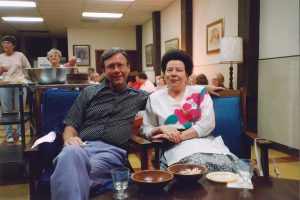
The ministry of deacon dates to the earliest days of the Church as seen in the first verses of chapter 6 in the Acts of the Apostles:
At that time, as the number of disciples continued to grow, the Hellenists complained against the Hebrews because their widows were being neglected in the daily distribution. So the Twelve called together the community of the disciples and said, “It is not right for us to neglect the word of God to serve at table. Brothers, select from among you seven reputable men, filled with the Spirit and wisdom, whom we shall appoint to this task, whereas we shall devote ourselves to prayer and to the ministry of the word.” The proposal was acceptable to the whole community, so they chose Stephen, a man filled with faith and the holy Spirit, also Philip, Prochorus, Nicanor, Timon, Parmenas, and Nicholas of Antioch, a convert to Judaism. They presented these men to the apostles who prayed and laid hands on them.
For some reason through the centuries the role of deacons decreased to being a step towards becoming a priest. The Council of Trent proposed restoring the order, but it wasn’t until the Second Vatican Council that the permanent diaconate was reinstated and this month celebrates the 50th anniversary of the reinstatement.
From that date, the term “clergy”, meaning ordained, included permanent deacons, along with priests and bishops.
As Deacon Walden began ministry as an ordained his role was not well understood – even some priests referred to him inaccurately as a “lay deacon”.
“Being a deacon is all about serving,” Deacon Walden said and his service was wide ranging – chaplain work at the South Dakota Penitentiary and hospitals, counseling and administrative work at parishes and the Good Shepherd Center.
“Most people were receptive and as the first, I tried to be a role model,” he said.
He must have done reasonably well – another 47 from all around the diocese have been ordained permanent deacons, including four this past May. Many other deacons, ordained in other dioceses, have moved to the diocese for various reasons and ministered here through the years.
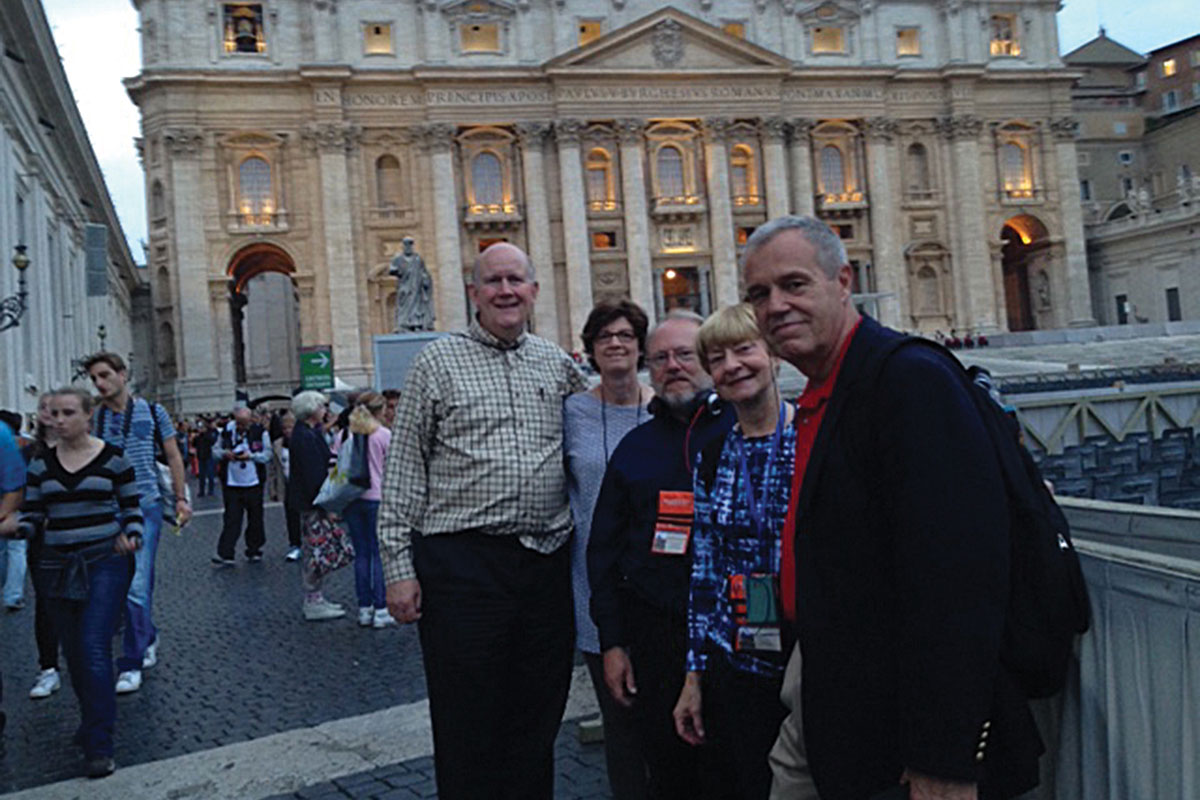
Humbled by the opportunities
“One of the beautiful things about deacons is we come from all walks of life, working in many areas to support our families,” said Deacon Roger Heidt.
“The ministry God calls us to is unique to each man and we only need to open ourselves to this call and allow God to lead us,” he said. Deacon Heidt was ordained for the Diocese of Rapid City, but was working in Pierre when asked to get involved in the formation program for the Diocese of Sioux Falls.
In 2004 the National Directory for the Formation, Ministry and Life of Permanent Deacons by the US Bishops was published and Heidt was asked to implement the guidelines in this diocese.
“The document has 4 dimensions, the same as priestly formation,” said Deacon Heidt.
“They are: Human Dimension, Spiritual Dimension, Intellectual Dimension and the Pastoral Dimension. One of the challenges in leading a formation program is to integrate the 4 dimensions when you have the challenge of men who are working regular jobs and in many instances have to travel to attend weekend sessions,” he said.
Like the forerunner, Deacon Walden, most deacons felt the call to serve, yet feel humbled at the opportunities that come their way.
“Early in my ministry, I served as a hospital chaplain and I remember my first few meetings with dying patients and their families,” said Deacon Peter Mehlhaff, ordained in 2000.
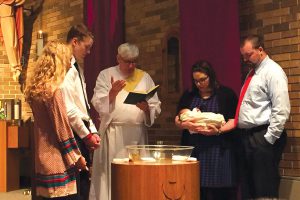
“I felt so bad for everyone and would wish there was someone better than me to meet with these people. Certainly there are many with gifts and talents that can serve people more effectively than I can. However, I’ve come to accept that, at times, I am the one that is there to serve and that if I do my part, God will do His part. It was a profound experience for me to realize that while exercising ministry, God is at work in each person’s life and that all He needed from me is to be faithful and to be there,” he said.
Deacons in the Diocese of Sioux Falls may be most visible when assisting at the altar or occasionally preaching. But it is their work in hospitals, nursing homes, jails and detention centers, and doing home visits and sacramental preparation where serving is the priority.
“The grace of the Sacrament of Ordination to service in the church as a deacon has been more effective and most clear to me in times of direct service,” said Deacon John Devlin, ordained in 2007.
“As I have visited people in difficult situations, whether in be in the jail, the Juvenile Detention or in service to the poor through the St. Vincent DePaul Society, I have been amazed at the how the Spirit shows up and gives me words that I would never have thought up on my own.
“I know it is the Spirit of God acting through me because of the effect of those words – comfort, consolation and even healing. These things I could NEVER do on my own,” Deacon Devlin said.
Deacon Leon Cantin, ordained in 2000, spends considerable time as a spiritual director to those in treatment for alcohol, drug and gambling addictions.
“It is remarkable the conversations, questions, requests made by the patients I meet in that ministry,” he said. “God bless the priests who visit the treatment center to hear confessions …some for the first time since Confirmation. I have seen some miracles of recovery and spirituality,” he said.
While most service opportunities fall within the parish or diocesan ministries, outreach to the broader community also presents itself, especially in rural communities.
“The primary role of a deacon exists to serve those people of the parish and the community. They have a unique role due to the fact that they are an ordained minister working and interacting in the secular world. Deacons have a wonderful opportunity to bring the person of Jesus Christ to people who may not encounter Him otherwise,” said Deacon Jim Bregel, ordained in 2015.
He was just in his second year when asked to revive the Chamberlain Community Thanksgiving meal which had fallen by the wayside several years earlier.
“Knowing this could exist as a daunting task, I asked for some time to pray about it and ask for the guidance of the Holy Spirit,” Deacon Bregel said.
“I finally decided to undertake this project and began to ask for volunteers to serve on the committee. The last two years I have had eight committee members and countless community volunteers. Local businesses donate all of the major traditional food items for the meal and families from the local churches prepare desserts and salads.
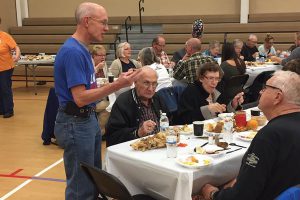
“The first year we solicited monetary donations from businesses and due to the overwhelming response did not ask for donations last year. We have served approximately 400 people both years, a Traditional Thanksgiving Meal at no charge to anyone. Included in this number are about 70 home bound deliveries, deliveries to the local jail, gas stations, and other places where people must work on the holiday. We do not solicit donations but people insist, so we use any monetary or non-perishable food items received for the local food pantry. Last year we received a tremendous amount of donations, all benefiting the local food pantry,” Deacon Bregel said.
Deacon Barry Wagner, ordained in 1991, said he has found it important to be open and listening to people regardless of their circumstance.
He tells of a man who shared that he didn’t believe in God. Wagner asked permission to pray for him and prayed “God, thanks for the creation of all life, for the beauty of this day. I ask your blessing upon your servant, grace him with healing in Body, Mind, and Spirit.” Deacon Wagner said the man went home but was back a few weeks later looking for him.
“He said, ‘Deacon, you had a prayer that touched my heart.’ I said, ‘Thank you. Now I have a question: Are you thinking maybe God loves you?’ He was quiet for a time and then this fella said, ‘Maybe there is a God of love and mercy.’ I said, ‘God’s peace be with you until we meet again one day,” Deacon Wagner said.
The critical role of spouses
Deacon Heidt, who recently retired as director of deacon formation, said the involvement of the wives, for men who are married, is critical to the success of the diaconate.
“One aspect of formation that hasn’t changed from my perspective since 1980 when Diane and I began formation is the need for wives to attend the formation weekends,” he said.
“While we don’t require them to do the work, it is important for them to experience the spiritual growth themselves as well as their husband, and in many cases it is a time of conversion for them as they grow in their understanding and love of Christ and his Church.
“The wives must also give written consent a number of times through the formation process that they affirm their husband’s participation in the program and prior to ordination their agreement with his desire to seek ordination. It is difficult to imagine a spouse giving agreement if they don’t understand their husband’s request for ordination as a permanent deacon,” Deacon Heidt said.
And even after being ordained for more than 30 years, Deacon Heidt said he is still learning.
“One of the interesting developments for me over the past four years is to understand that balancing our married life, our working life and ministry is the wrong approach. I have come to see that it is one of integration. How do you integrate the many aspects of your life? The answers I believe are different for each of us and for each of us have to be worked out with your spouse, family and work,” he said.
Beginning the formation program
When Bishop Paul Dudley asked Fr. Jerome Holtzman in 1981 to lead the first formal program for deacon formation he wasn’t sure what it would look like. To that point in time, in addition to Walden, Deacon Ed Zephier had been trained individually and ordained in 1979.
“Bishop Dudley offered us the vision of service and pastoral care as our basic goal and need of the Diocese,” Fr. Holtzman said and a program with a committee and a teaching staff aimed to meet that goal.
“We met once a month at the Minor Seminary (now O’Gorman Jr. High). We conferred with other developed formation programs and attended conferences,” he said.
“It was an exciting experience of the Holy Spirit in developing a growth of what it is to be a deacon – what that personal call – vocation- to serve the poor; discernment evolved eliminating thoughts of personal ego trips – it reaffirmed the deacon as an ordained minister, a member of the clergy – not a step to the priesthood, nor was it a lay ministry” said Fr. Holtzman.
Three years later, January 1994, the first class was ordained, with a second class ordained just a year later.
“I will be eternally grateful for the witness of faith I saw in the men whose lives have been changed as followers of Christ, to the wives who faithfully supported their husbands in their journey, to all the instructors who helped clarify the meaning of the Gospel to our deacons,” said Fr. Holtzman.
Deacon Henry Knapp was ordained in the group in January 1985, and then with wife Christine became directors of the program, leading the next groups which were ordained in 1991 and 1994.
“Christine was fully employed by the Diocese (Catholic Family Services); I was uncompensated. And since I had a secular full-time job at the time, Christine put in more time than I did as co-director. But, in terms of program focus, we fully shared responsibility,” Deacon Knapp said.
“In terms of what I have sensed that the Lord wanted to be my focus as a deacon, there are two things:
- help bring people close to Jesus, and
- help lay people understand that they are a key and integral part of building the Kingdom of God, both here on earth and in heaven.
“After about 33½ years of ministry, I can look back and see that both my liturgical and non-liturgical ministry have evolved and, over time, have more fully supported those two primary roles,” he said.
“It never ceases to amaze me that the role of deacons in our diocese is so broad and so varied. No two of us have the same focus. That seems so right and proper. God has created and gifted His people in a seemingly infinite number of ways,” said Deacon Knapp.
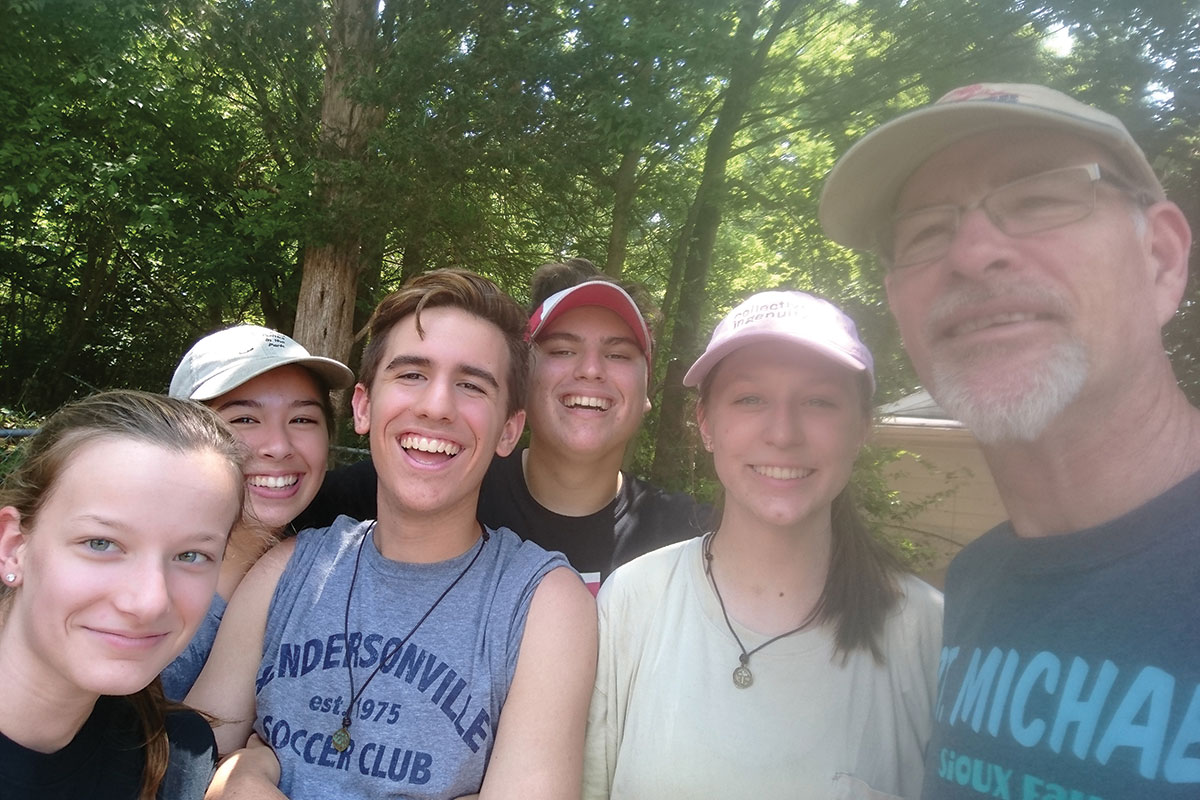
Hearing and heeding the call
Hearing the call and deciding to pursue it are also unique to each deacon. Often someone suggests that they would be a good deacon or they get a notion about it in prayer.
For Deacon Devlin, who will be taking over the deacon formation program, it was prayer and friends.
“I did not respond at first, thinking I was simply not worthy of such a high calling but the nudge from God and the suggestions of others kept coming,” he said.
“I finally decided to quit thinking about it and bothering my wife with it until someone who had never spoken to me about in the past would bring it up on their own. That was on a Sunday morning just before I left the house for Mass. When I arrived at St. Michael Church about 5 minutes later I came face-to-face with our pastor, Fr. Joe Vogel. I said ‘good morning, Father’ and he replied ‘have you ever thought about being a deacon?’ That is a quick answer to prayer so I began the process of entering the formation program,” Deacon Devlin said.
Deacon Cantin was active in parish ministries as well as in Cursillo where he met men who were deacons or in formation.
“They were men of faith and spirituality and I was attracted to them, wondering if I could be like them,” he said, and following a discernment period, consultation with his wife, family and pastor, sent in his application.
Deacon Bregel was visiting his brother’s family in Minnesota where a deacon assisted at Mass.
“…my brother asked me if I had ever considered becoming a deacon,” Bregel said.
“Other members of my parish had asked that same question in the past, but coming from my brother it hit home. About a week later an advertisement appeared in the Bishop’s Bulletin announcing the beginning of another cohort for diaconal formation in September of 2011. Moved by the Holy Spirit I went to work on the application process…,” he said.
After Deacon Knapp and his wife Christine attended a Marriage Encounter they found themselves getting active in various ministries, and Knapp started doing annual silent men’s retreat.
“In the early summer of 1981, I was attracted to a notice in our parish bulletin about a diaconal information meeting in our parish rectory,” Deacon Knapp said. With the encouragement of his parish priests and others, he applied.
Deacon Mehlhaff’s first experience with discerning came as a young man in the seminary who discerned priesthood was not his call. The diaconate did not enter his mind.
“About 20 years later my family moved to a parish that had two wonderful deacons,” he said.
“One morning, because of travel obligations, neither I nor my brother was able to attend a father/son activity at my son’s elementary at school. I asked Deacon Jerry Wathen if he could help me out. My son was delighted to have Deacon Jerry as his partner at school and their friendship grew out of this experience.
“I was awed by power of presence demonstrated by this humble deacon. Over time the thought of serving God through the diaconate started coming to my mind. Eventually I talked to my pastor and with his encouragement; I applied for admission to candidacy and began formation,” said Deacon Mehlhaff.
Special moments as deacons
Deacon Walden recounts one of his most memorable deacon moments was in the Warden’s office at the South Dakota State Penitentiary.
“Russell Means had been stabbed; the prison was in lock down so I couldn’t leave. With Warden Herman Solum we met with Marlon Brando, Harry Belafonte and attorney William Kunstler to assure them that the rights of Native Americans were being observed,” Deacon Walden said. Means he said, appreciated not just that meeting but his ministry at the prison.
Deacon Cantin mentioned a visit to a homebound lady who was seriously reading the Bible as he approached.
“Be quiet, I am preparing for my finals,” she told him.
Deacon Heidt, who also worked in diocesan planning in recent years was coming home after three days on the road with some intense meetings on possible parish closures or mergers.
“As I pulled into the Cathedral parking lot to exchange the diocesan car for my personal car, two of the Adoration Sisters of the Blessed Sacrament ‘the Red Sisters’ who live in the monastery on the Cathedral grounds were going from their little garden to the monastery and as they were going by I said ‘Good evening Sisters,’ and they smiled and responded, ‘Good evening Deacon, how are you?’ and I in all sincerity said ‘I am bone tired, I have been on the road for three days and it’s been stressful’. One of the sisters with a big smile on her face responded ‘Remember Deacon, you did it for Jesus!’ My motto from that day forward has been ‘Remember Deacon, you did it for Jesus!'”
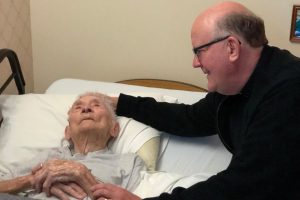
Deacon Mehlhaff began taking Eucharist to the home of Alfred and his wife Lillian Kirchgasler when Alfred was 91 years old. Their relationship has continued over the last 15 years. Deacon Mehlhaff now visits Alfred at Mother Joseph Manor in Aberdeen.
Are you or is someone you know being called?
“I encourage men of our diocese to be aware of the possibility that they may be called to the diaconate,” Deacon Devlin said.
“Men who pray often and spend intentional time listening to God will be the ones who hear the call to look into being a deacon or the many other ways God may need them to serve His people,” he said.
Deacon formation director Deacon Devlin can be reached through the Chancery, 605-334-9861 or dcnjohndevlin@sfcatholic.org

